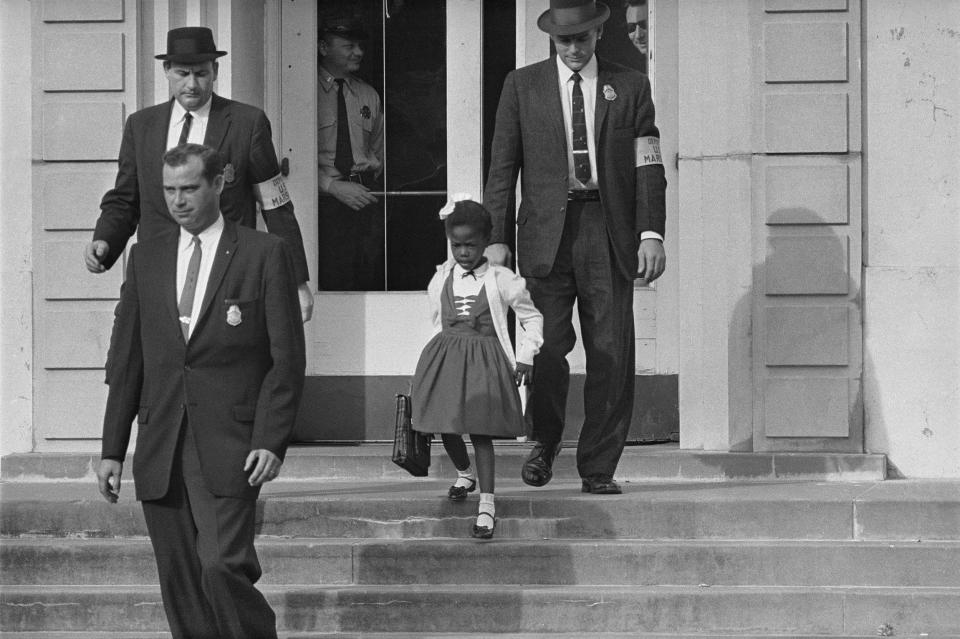Florida elementary school temporarily bars ‘Ruby Bridges’ film following parent’s complaint

A Florida school district has temporarily barred students from viewing a historical film about real-life civil rights pioneer Ruby Bridges at an elementary school after a parent filed a complaint this month.
The film “Ruby Bridges,” a historical drama about 6-year-old Bridges integrating a New Orleans elementary school in 1960, was shown at North Shore Elementary in St. Petersburg, Florida, to approximately 60 second grade students on March 2. Each child required a signed permission slip to view the film, according to the Tampa Bay Times.
The parents of two students declined to allow their children to watch the film, and one of those parents filed a complaint on March 6, after watching the first 50 minutes of the film. The parent alleged that the film teaches students about racial slurs and how “white people hate black people,” according to the complaint, which was acquired by NBC News.
After the parent requested that the school district remove the movie from the school’s list of approved films, Pinellas County Schools officials temporarily banned “Ruby Bridges” from the elementary school until it’s assessed by a committee. A link to the trailer was provided in the permission slips for all parents to review, Pinellas County Schools public information officer Isabel Mascareñas told NBC News.
After the complaint was filed, Mascareñas said in a statement to NBC News, “it was communicated with the parent that the school would not have any future showings during this school year as the movie had already been shown.” She also said the movie, which is not rated, remains available through the district’s licensed movie library.

The 1998 Disney film portrays Bridges experiencing racist encounters while seeking an education. Directed by Euzhan Palcy and written by Toni Ann Johnson, “Ruby Bridges” earned several accolades, including a Christopher Award and a Gold Apple from the National Educational Media Network. The film was also a 1999 NAACP Image Award nominee for outstanding television movie or mini-series.
Pinellas County Schools previously faced pushback earlier year after it banned Toni Morrison’s “The Bluest Eye” from all high schools following a parent’s complaint about the book’s rape scene. Following the ban, several students protested for the book to return to their advanced literature curriculum.
Last year, Florida Gov. Ron DeSantis signed into law the Stop WOKE Act, which restricts race-inclusive teachings in schools. In January, DeSantis’ administration blocked an Advanced Placement course on African American studies from being taught in the state’s high schools.
While “Ruby Bridges” is not permanently banned in the school district, the move has prompted some Black-led organizations, such as the Concerned Organization for Quality Education for Black Students, to implement a call of action to protect the teaching of Black history in schools. The organization’s efforts aim to ensure Pinellas County Schools provides quality education to Black students.
“Many from historically marginalized communities are asking whether this so-called integrated education system in Pinellas County can even serve the diverse community fairly and equitably,” Ric Davis, the organization’s president, wrote in a letter, according to the Tampa Bay Times.
Goliath Davis III, a former police chief in St. Petersburg, also criticized the district’s move in an op-ed in The Weekly Challenger on Saturday.
“Isn’t it curious that the district purports to value ‘cultural competency and ‘integrity,’ encourage the celebration of Black History Month and within three months, ban a book by an award-winning Black writer and a film on the life of a 6-year-old Black girl attempting to obtain a quality education while facing death threats and racial epithets?” he wrote.
The school is expected to engage in the formal objection process to review the film challenged by the parent, Mascareñas said. The date has not yet been confirmed.
This article was originally published on NBCNews.com

